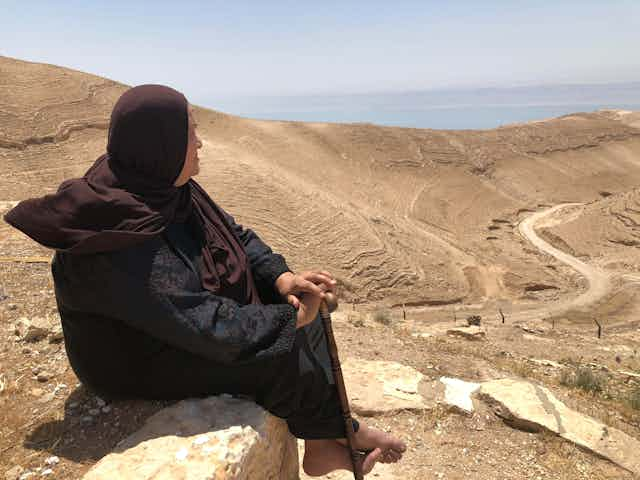Modern settlers to Palestine viewed the desert as something they needed to “make bloom.” But it already was, thanks to the long history of Palestinian agricultural systems.
As violence continues to erupt in Gaza, and more than 200 hostages taken by Hamas on Oct. 7 remain missing, many of us are seeking to better understand the context of the Israeli-Palestinian conflict that has been raging for decades.
Some of us assume that the violence between Jewish Israelis and Palestinians — a majority of whom are Muslim — is a religious conflict, but a closer look at the history of the last century reveals that the root of the tension between the two communities is more complicated than that.
At its root, it’s a conflict between two communities that claim the right to the same land. For millions of Palestinians, it’s about displacement from that land.

Land has so much meaning. It’s more than territory; it represents home, your ancestral connection and culture — but also the means to feed yourself and your country.
One of the things that colonizers are famous for is the idea of terra nullius – that the land is empty of people before they come to occupy it.
In the case of Palestine, the Jewish settlers in 1948, and the British before that, viewed the desert as empty — something they needed to “make bloom.”
But the land was already blooming. There is a long history of Palestinian connection to the land, including through agricultural systems and a rich food culture that is often overlooked by colonial powers.


Our guests on this week’s episode of Don’t Call Me Resilient have been working on a film about the importance of preserving Palestinian agriculture and food in exile.
Elizabeth Vibert is a professor of colonial history at University of Victoria. She has been doing oral history research to examine historical and contemporary causes of food crises in various settings, including Palestinian refugees in Jordan.
Salam Guenette is the consulting producer and cultural and language translator for their documentary project. She holds a master’s degree in history.
The relationship with agriculture and the land is the original colonizing relationship. The colonizers came in, viewed Indigenous peoples worldwide as not moving and living appropriately and productively enough on the land. - Elizabeth Vibert, professor of colonial history
Read more in The Conversation
Read more: How colonialist depictions of Palestinians feed western ideas of eastern 'barbarism'
Read more: How women in Israel and Palestine are pushing for peace — together
Read more: Israel-Palestine conflict: How sharing the waters of the Jordan River could be a pathway to peace
Read more: Recognition versus reality: Lessons from 30 years of talking about a Palestinian state
Resources
Dear Palestine by Shay Hazkani
A Guide to Palestinian Wild Food Plants by Omar Tesdell (and collective)
A Day in the Life of Abed Salama: Anatomy of a Jerusalem Tragedy by Nathan Thrall
Listen and follow
You can listen to or follow Don’t Call Me Resilient on Apple Podcasts, Spotify, YouTube or wherever you listen to your favourite podcasts.
We’d love to hear from you, including any ideas for future episodes. Join The Conversation on Twitter, Instagram and TikTok and use #DontCallMeResilient.

